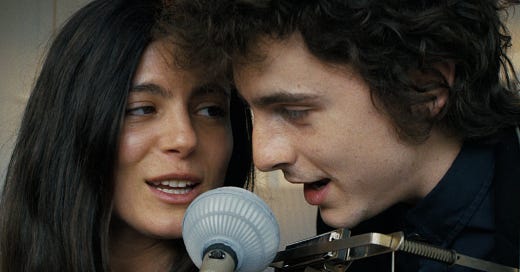Most of the issues I have with A Complete Unknown, the latest in a long line of music biopics, can be boiled down to the fact that music biopics are likely one of the lowest forms of cinema. I say this with love and respect for the form and a good deal of envy directed towards James Mangold, who has made a career out of retreading the steps of geniuses and, in humanizing them, elevating them to the level of gods. However, A Complete Unknown has more interest in its subject than most of the swill that’s been pedaled to me in the past decade. But, to be fair, I’m one of the many millions who will be watching A Complete Unknown and feeling that inescapable need to be and have Bob Dylan, something he would hate me for.
The critics and fans have already made their opinions on Timothée Chalamet’s performance loud and clear, and I can’t disagree. Chalamet is discussed to death, and his media presence has pushed me a little too close to growing weary of him. However, his years of preparation paid off enormously. He’s fantastic, and he’s Dylan, both the man and the myth of him. Thanks to Chalamet’s anchoring performance, A Complete Unknown gets away with a lot, letting Chalamet do the heavy lifting on making the audience care about this ephemeral man that you never actually know anything about.
Of course, this is the point of a figure like Dylan. This is why we love him. He’s the conduit for the music that transports us in everyday life and buoys the story in A Complete Unknown. Letting the music speak is the best thing A Complete Unknown does, allowing the petty dramas and Dylan’s tantrums to fall away. It’s a reminder that there’s a reason why we’re all so ready to forgive these men who we’re asked over and over to love; once in about 300 million, one of them might have something interesting to say. The music-heavy approach of A Complete Unknown works, and I wouldn’t have it any other way.
A Complete Unknown recognized early and often that its dialogue is the weakest aspect of the entire project. The last exchange between Dylan and Baez is painfully contrived, and everything out of the mouth of Dylan’s manager, Albert, played by a predictable Dan Fogler, gets even more difficult to stomach as the movie progresses. It unfolds predictably and earnestly, even as the centerpiece of Dylan loses his ability to take things at face value. I despise when biopics end with lines of text telling me where they are now. But, again, it’s the form, not the content.
Though Chalamet does the brunt of the work, it’s hardly a solo performance. Elle Fanning had the eternally unforgiving job of playing the woman almost-scorned, who can’t and won’t compete with the fame. Sylvie is based on the real Suze Rotolo, a fully realized woman with a far-reaching life of her own. However, the failure of not A Complete Unknown but the genre itself is that no one but Dylan can be allowed to hold the audience’s interest too deeply. He’s awful to Monica Barbaro’ Baez, but even her challenges of Dylan’s behavior are remarkably unimportant. They’re tough parts, but Fanning and Barbaro play them admirably, forcing more than one note out of the characters, kicking and screaming.
In the same way that Barbaro and Fanning never had a chance to be memorable, there can be nothing truly boundary-pushing or revolutionary in a movie like A Complete Unknown, and I appreciate that the movie really doesn’t even try to pretend that it’s taking any sort of stance. We will all grow older and see our ways changed and taken over by the next generation, and in the end, these newcomers will be obsolete one day, too. Music, like everything else, must evolve, and if we don’t keep up, we’ll be left behind. If there’s a message to be found in A Complete Unknown, it’s this. However, it’s just as easy to walk out of the movie feeling almost exactly the same as when you came in.
I’m going to see A Complete Unknown again and soon. Maybe I’ll be more charmed or more disillusioned. Maybe, next time, I’ll be able to ignore the fact that Chalamet is doing both an excellent emulation of Dylan and an impression of an ex-boyfriend viewers might find themselves reminded of. One of the many young men whose walk will likely take on the strangest affectation in the coming months. Hats, sunglasses, and shirts buttoned all the way up will be very big this year. But I can’t blame the original for the shallow reflections that have cropped up over the years.
The cynical part of me has reservations about A Complete Unknown, and its surface-level explorations will likely turn off the more discerning audience members. However, the part of me that holds onto a shred of hope every now and then must acknowledge that it’s fun to step back in time to the moments that have become legends to so many young artists desperate to believe that they’ll have their own Chelsea Hotel. Maybe it’s good enough that people will turn on Dylan’s music and remember there’s a message behind it. Or don’t play his albums; I doubt he’ll care.
A Complete Unknown: 3 / 5




